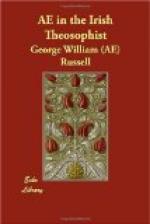In the sacred books of India it is the claim of many sages that they have recognised “the ancient constant and eternal which perishes not through the body be slain,” and there are not wanting to-day men who speak of a similar expansion of their consciousness, out of the gross and material, into more tender, wise and beautiful states of thought and being. Tennyson, in a famous letter published some time ago, mentioned that he had at different times experienced such a mood; the idea of death was laughable; it was not thought, but a state; “the clearest of the clearest, the surest of the surest.” It would be easy to do on multiplying instances.
Now in a nature where unity underlies all differences, where soul is bound to soul more than star to star; where if one falters or fails the order of all the rest is changed; the duty of any man who perceives this unity is clear, the call for brotherly action is imperative, selfishness cannot any longer wear the mask of wisdom, for isolation is folly and shuts us out from the eternal verities.
The third object of the society defined as “the study of the psychic powers latent in man” is pursued only by a portion of the members; those who wish to understand more clearly the working of certain laws of nature and who wish to give themselves up more completely to that life in which they live and move and have their being; and the outward expression of the occult life is also brotherhood.
—Nov. 15, 1892
The Hour of Twilight
For the future we intend that at this hour the Mystic shall be at home, less metaphysical and scientific than is his wont, but more really himself. It is customary at this hour, before the lamps are brought in, to give way a little and dream, letting all the tender fancies day suppresses rise up in out minds. Wherever it is spent, whether in the dusky room or walking home through the blue evening, all things grow strangely softened and united; the magic of the old world reappears. The commonplace streets take on something of the grandeur and solemnity of starlit avenues of Egyptian temples the public squares in the mingled glow and gloom grow beautiful as the Indian grove where Sakuntala wandered with her maidens; the children chase each other through the dusky shrubberies, as they flee past they look at us with long remembered glances: lulled by the silence, we forget a little while the hard edges of the material and remember that we are spirits.
Now is the hour for memory, the time to call in and make more securely our own all stray and beautiful ideas that visited us during the day, and which might otherwise be forgotten. We should draw them in from the region of things felt to the region of things understood; in a focus burning with beauty and pure with truth we should bind them, for from the thoughts thus gathered in something accrues to the consciousness; on the morrow a change impalpable but real has taken place in our being, we see beauty and truth through everything.




